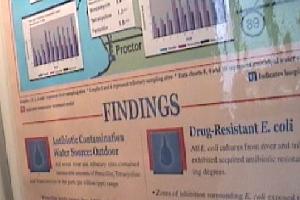Letter from Stockholm
U.S.A. Winner...
but the news is not all good.
|
|
Ashley Mulroy of the United States was announced as the winner of the Stockholm Junior Water Prize, which was presented by Swedish Crown Princess Victoria in a ceremony with music and inspirational words from senior scientists. Ashley, a student at the Linsly School in Wheeling, West Virginia examined water quality of a local creek and discovered that small amounts of chemicals, in this case antibiotics from the runoff from livestock feedlots, can cause e coli bacteria to become resistent to the drugs. Ashley entitled her poster "Correlating Residual Antibiotic Contamination in Public Water to the Drug Resistance of Escherichia Coli," and in it she describes her observation of how residuals of antibiotics used in livestock production were getting in local creeks and, even at parts per trillion, were helping e. coli bacteria "train" to mutate and become resistant to antibiotics. In her abstract she writes, "The presence of antibiotic contamination in American waterways results in a progressive resistance among some bacteria to those same antibiotics that once controlled them....Consider, for a moment, the quality of life and health in the absence of pharmaceutical breakthroughs such as Penicillin, Tetracycline and Vancomycin. This research may serve as a warning that the benefits of antibiotic drugs are gradually being neutralized, with the bacteria that survive non-lethal exposures to these former wonder-drugs developing into far more powerful versions of their former incarnations. A more responsible approach to prescription and utilization of antibiotics is necessary to enable medical science to maintain control of these microbial threats to public health." The implications of Ashley's work are enormous and dovetail with other research going on about the impact of not only pharmaceuticals but other chemical compounds which, especially in the industrialized parts of the world, pose a potentially enormous threat to long-term human and ecosystems health by triggering mutations and compromising the natural resistance of organisms that rely on water to bring in nutrients and remove excess waste through cellular walls. Ashley, who won the
United States competition for the Junior Award, has shared her
research with the regional EPA but, as of the conference, had
not heard back from them about her work. The implications of her
research may inspire increased research into the impact of such
pharmaceuticals on the environment, not only from agricultural
sources but also from human inputs, such as waste water treatment
plants. |



